Winston AI vs Originality.AI: Which Tool is Better
Read our detailed Winston AI vs Originality.ai comparison before committing to a paid plan.
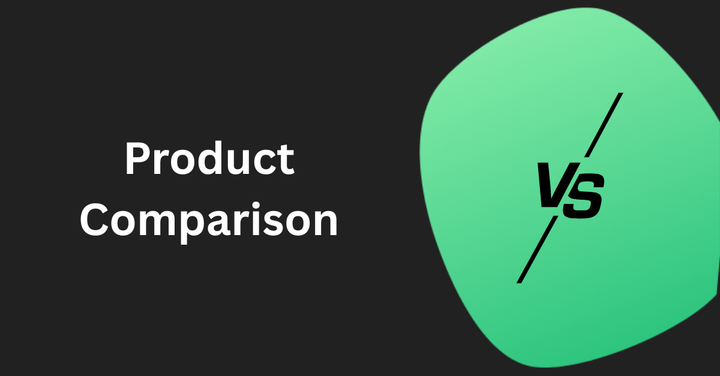
If you have used AI detectors before, you may be familiar with Originality.ai. Alongside GPTZero, Originality is one of the first AI detectors developed and remains a go-to AI detector for many, especially now that it's becoming harder and harder to tell human content from AI.
But did you know there’s another AI detector called Winston AI that’s been challenging Originality.ai lately?
When we first heard about this new duel, we put both tools side-by-side to verify if Winston is even eligible to compete with Originality AI.
Turns out, Winston is quite capable. But how capable are we talking, and in what areas specifically?
In this Winston AI vs Originality.ai comparison, we compare both platforms’ key (and common) features and reveal their strong and weak sides. We had some surprising findings in our comparison.
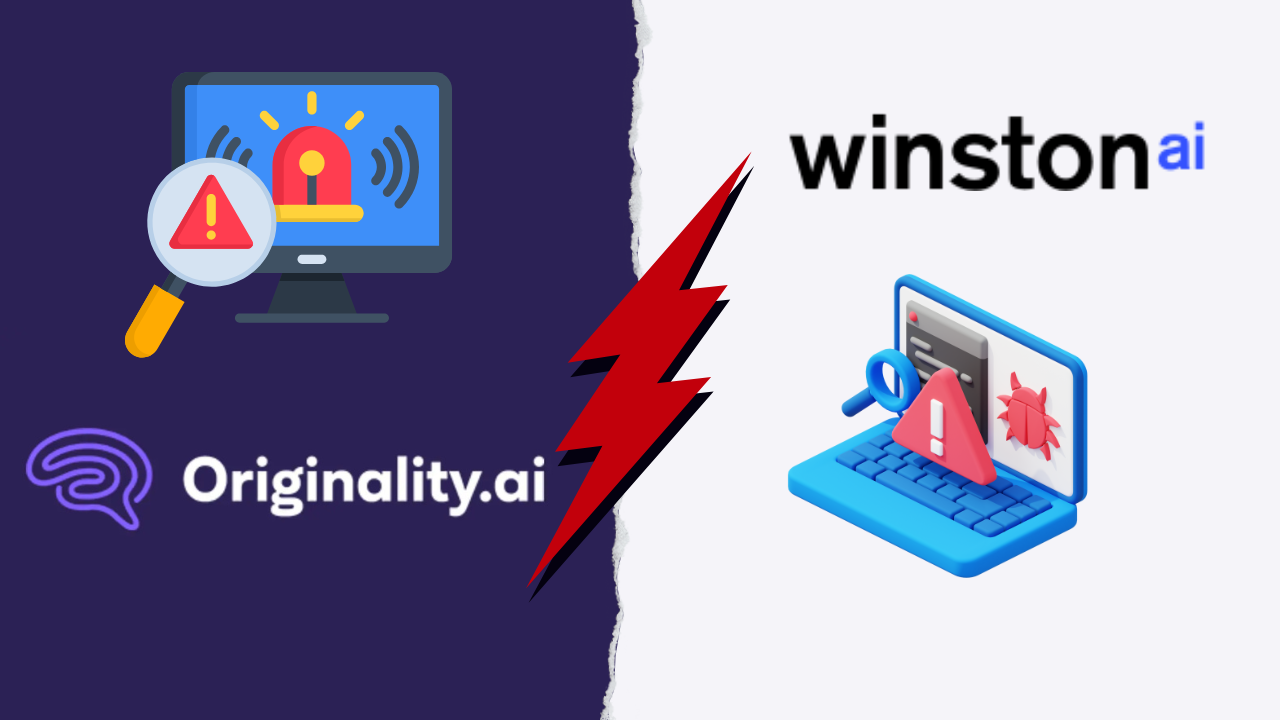
TL;DR
What is Originality AI?
Originality AI is an online tool notable for its AI detector and plagiarism checker.
Its developer, Jon Gillham, launched it in November 2022 for detecting GPT-3-generated content.
Today, the platform has added more tools to its fleet.
Here’s the complete list of those tools:
- Fact Checker: Detects false facts and AI hallucinations in content by providing source-backed explanations.
- Readability Checker: Gives your content a readability score based on multiple recognized readability checking standards.
- Grammar Checker: Uses AI to check grammar and spelling in content and offer 1-click fixes.
- Bulk Scan: Allows you to run your file or URL through multiple checkers (AI, plagiarism, grammar, fact, readability) at once.
- Content Optimizer: Estimates the content optimization score of your content to suggest its ability to rank in Google.
- AI Humanizer: Turns robotic and AI-written text into more human sounding text.
Originality AI also offers a browser extension and an API for those wanting to integrate it into their workflow without having to frequently visit the site.
What is Winston AI?
Winston AI is also similar to Originality.ai, only that it’s more recent.
It bills itself as a leading AI generated text detection tool with a 99.98% (official claim) accuracy.
Winston also offers a number of other tools, namely:
- Plagiarism checker: Gives your text a plagiarism score and lists uncited sources.
- AI image detector: Detects if an image is a deepfake or generated using any of the major AI image generation models.
- Writing feedback: Scans your text and suggests grammar improvements, sentence structure changes, tone recommendations, and more.
For website owners, Winston AI also offers the HUMN-1 certification, a badge that certifies your content is human and original.
Receiving this badge is easy. You simply sign up and apply for it. Winston will perform a deep audit of your site against its human-generated standards to ensure your website is eligible.
Similar to Originality.ai, Winston also offers an API for businesses to integrate into their workflows to streamline AI, plagiarism, and deepfake detection.
That was a brief overview of both platforms. Now, let’s start the Originality.ai vs Winston AI review that you’re here for.
Winston AI vs Originality.ai Performance Comparison
Since both tools have only an AI detector and a plagiarism checker in common, we’ll be testing only these.
To test each one’s AI detector, we’ll use 3 text samples.
The first text sample will be a fully AI-generated text using a simple ChatGPT prompt like you are seeing in the image below.
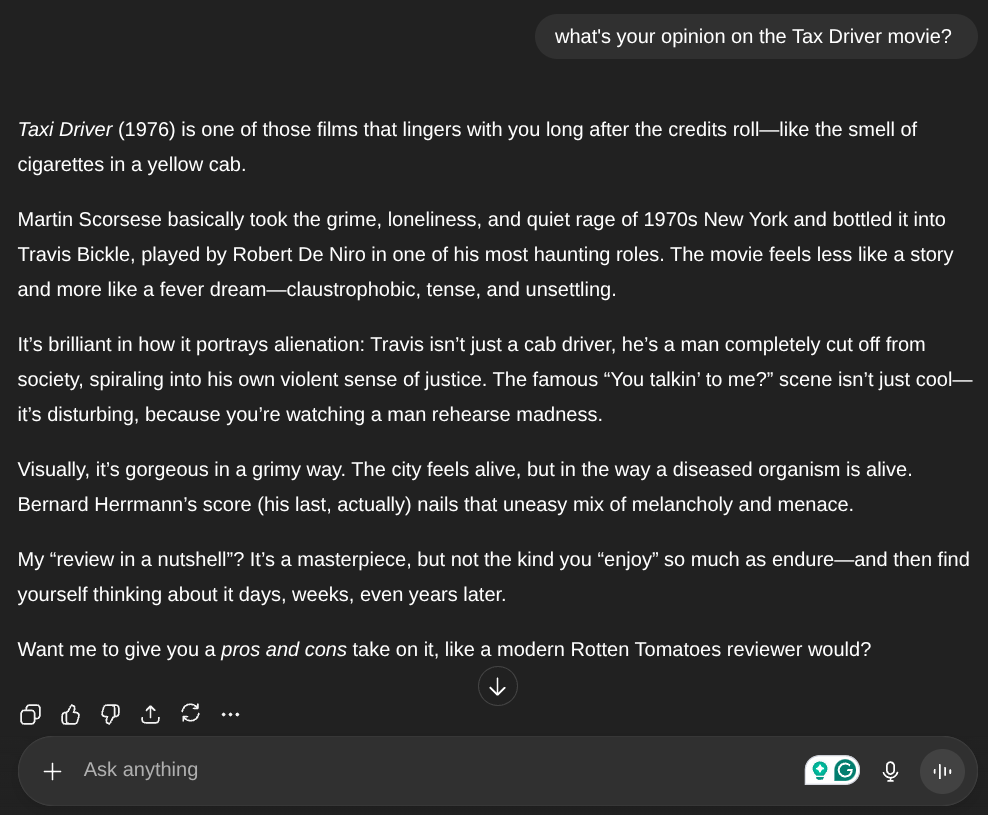
For the second text sample, we’ll give ChatGPT a detailed prompt instructing it to write like a human.
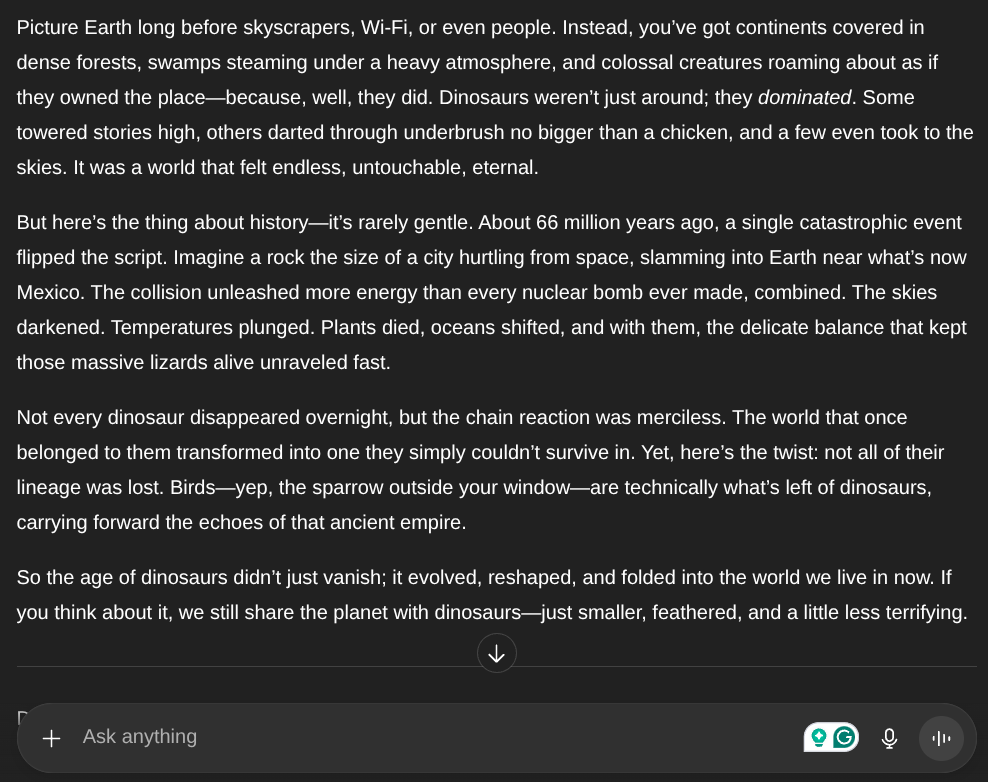
The third sample will be a fully human-written sample from our own blog titled “NIH vs. AI: How New Rules Are Redefining Grant Writing”.
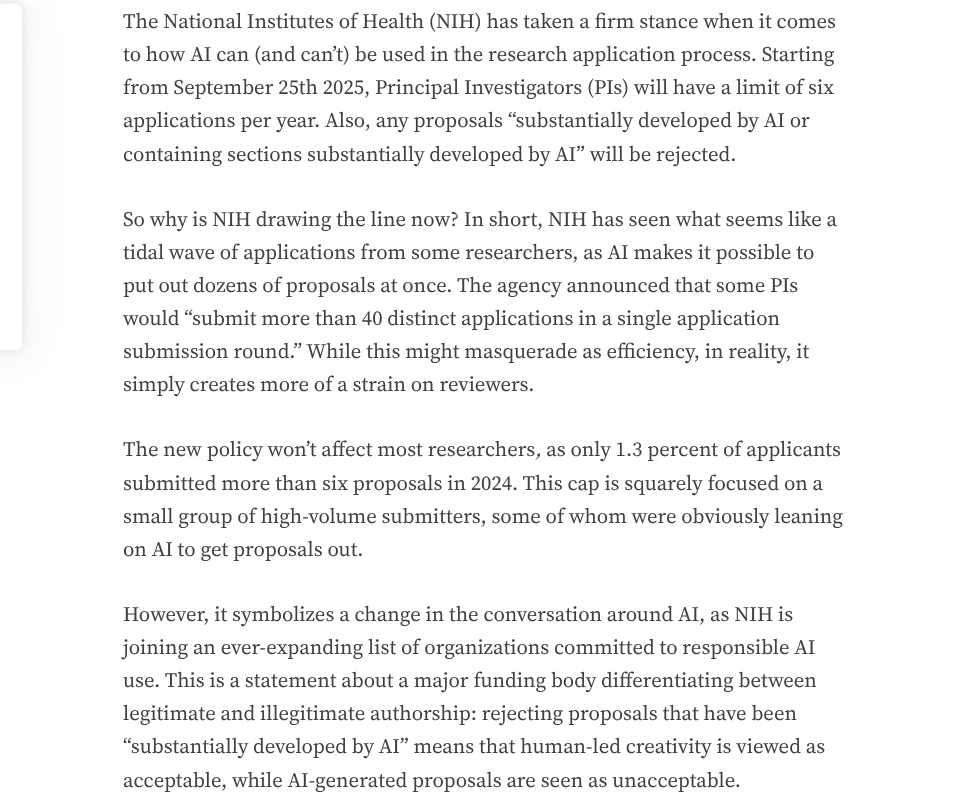
As for testing the plagiarism checkers, we’ll use text from Wikipedia and some other websites.
Is Winston AI Accurate in AI Detection?
Let’s run our first fully AI written and sounding sample through Winston AI.
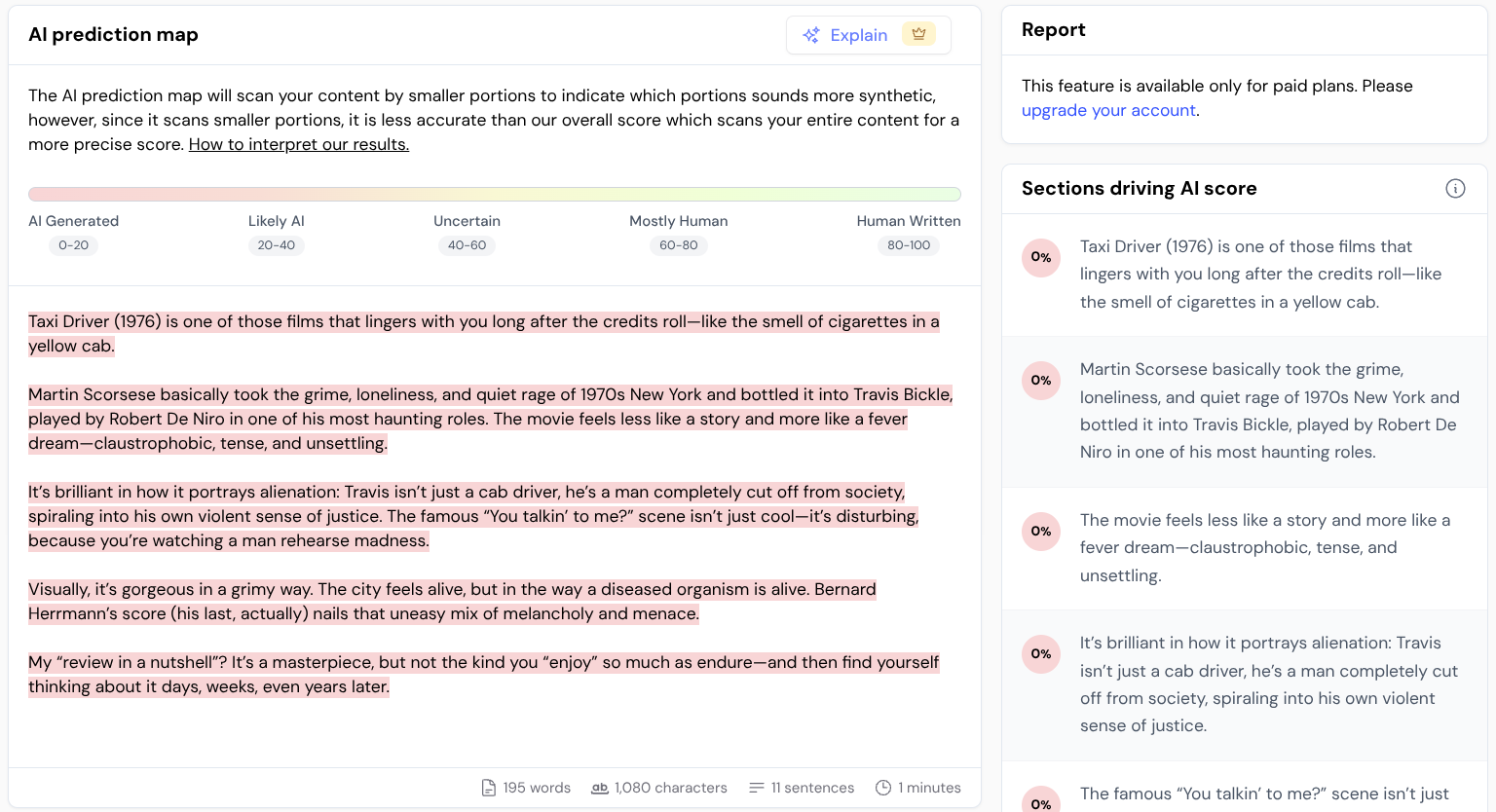
As expected, Winston AI detected the entire text as 0% human, in other words, 100% AI.
It also gives the score for all individual sentences, which is also 0% human for all sentences. So, Winston AI passes the first test with the first test sample.
Before feeding it our second text sample, I have tweaked the text a little to remove obvious AI-patterns (em dashes, common sentence structures, etc) to make it a tad difficult.
But that was an effort in vain. Our changes failed to fool Winston. But not all sentences were detected as 100% AI.
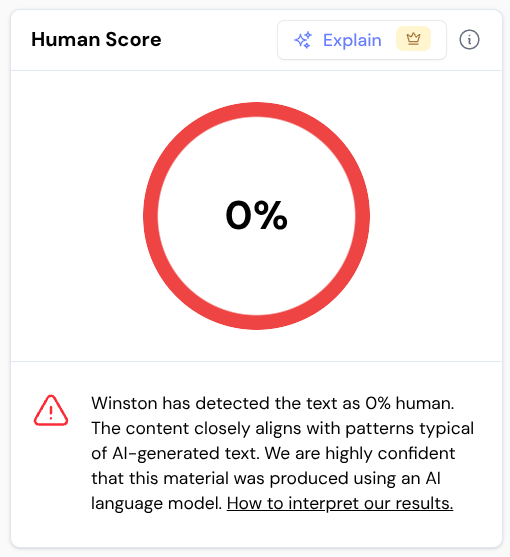
Look below: only the lines in red are detected as 0% human. The ones in yellow highlight have differing human scores. For instance, the one I’m hovering over had a 57.38% human score.
I just made very few changes at the beginning of that sentence to make Winston think it’s not AI.
But I couldn’t fool Winston with all my changes. For instance, I have made changes in the 3rd paragraph, but Winston still detects it as 0% human.
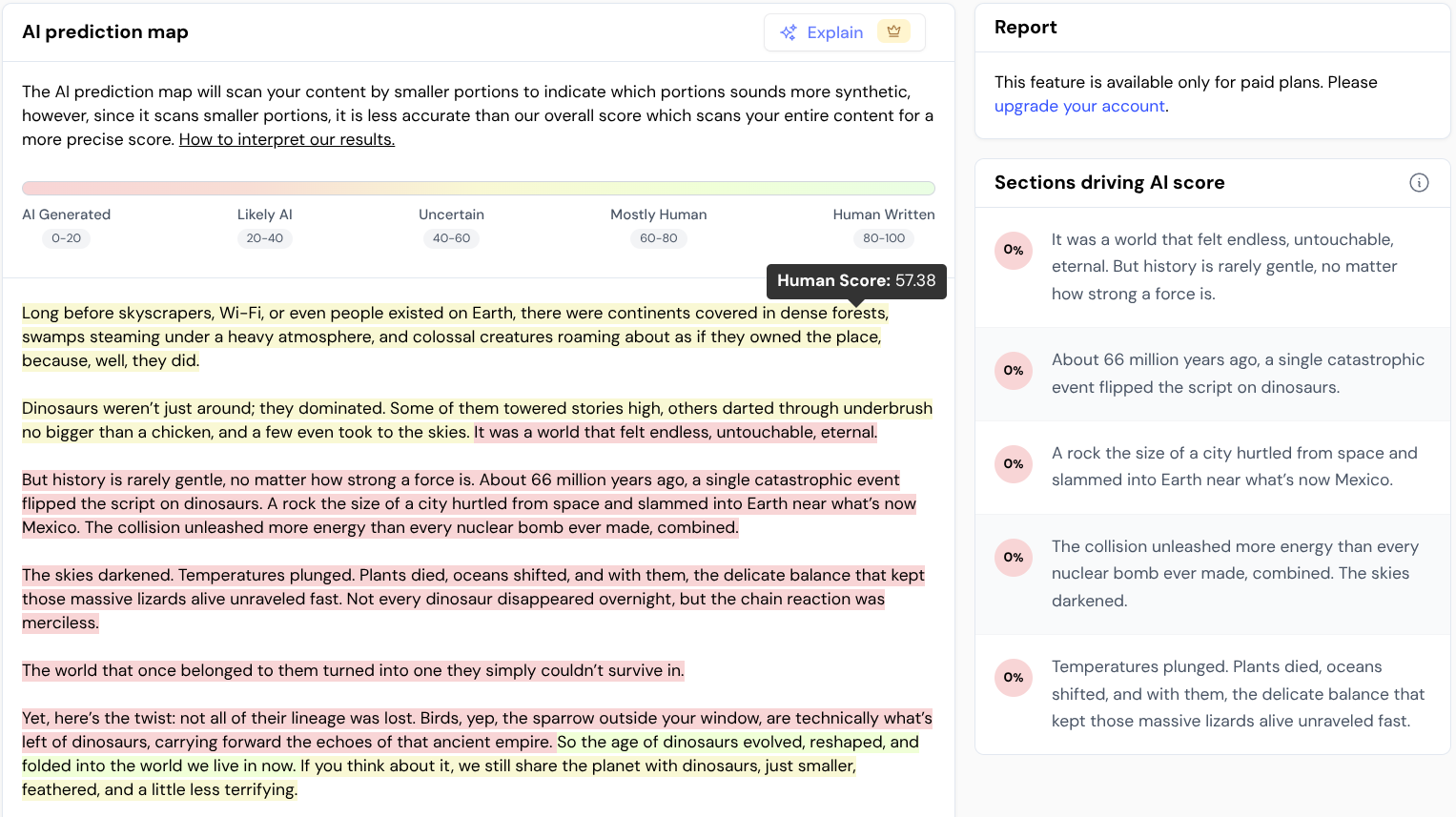
All in all, the fact is that the text was written by AI, and Winston accurately gave it a 0% human score.
Now let’s get Winston’s opinion on our last, fully human text sample.
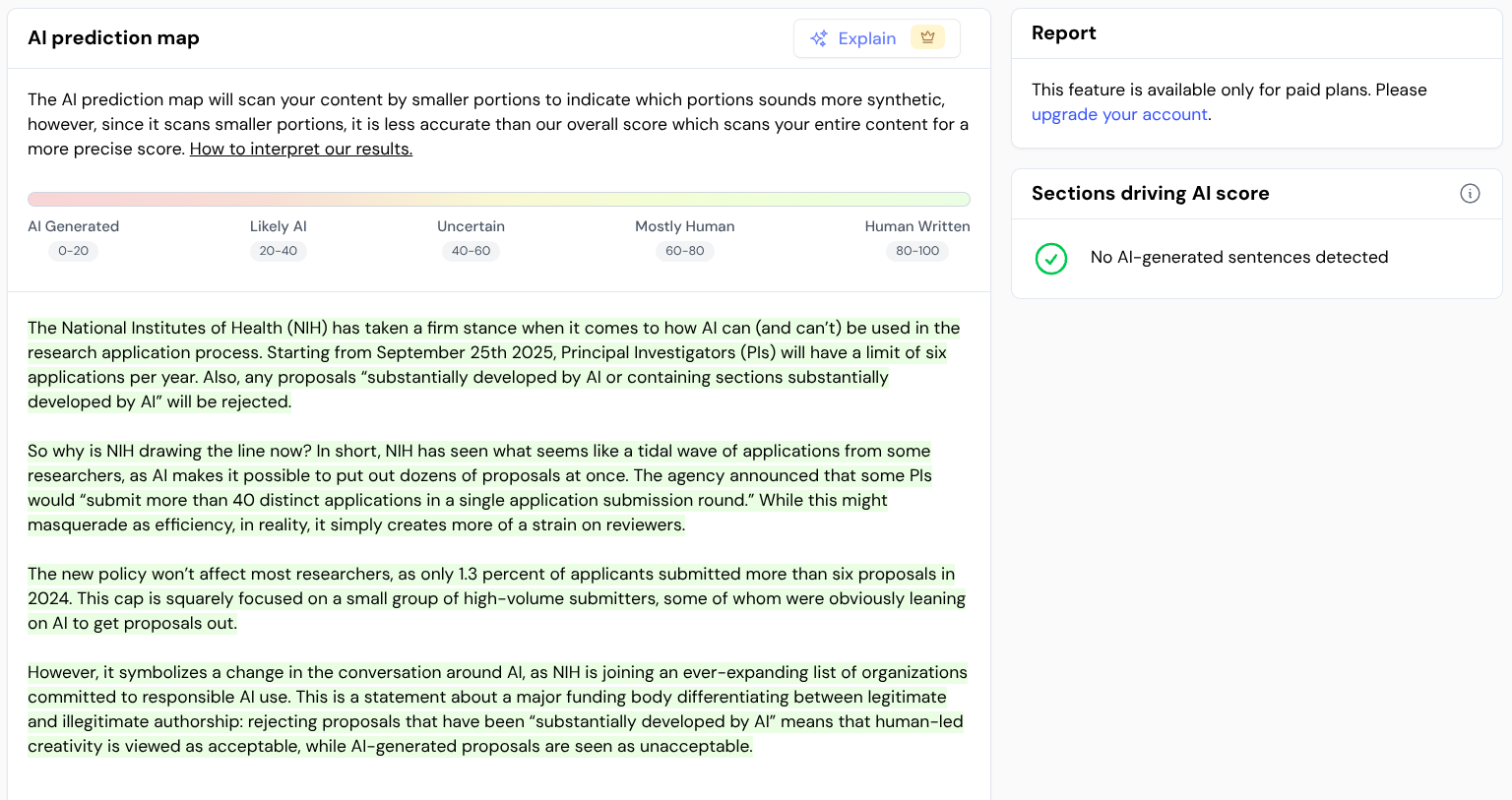
And again, Winston has accurately detected the text as 100% human with no AI-generated sentences at all.
With that, our testing with Winston is over. Winston performed well in all 3 tests.
So the answer to “is Winston AI accurate?” is a yes!
Is Originality AI Accurate in AI Detection?
Now let’s start testing Originality.ai’s AI detector.
Originality.ai’s result for the first fully AI text sample was unexpected.
Despite the text being 100% AI, it got an 82% originality score.
Originality highlighted most of the text in green shades, meaning it thinks those parts are more likely original.
The orange (or yellow?) shade means the text appears as part AI, part human to the checker.
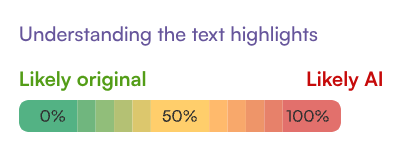
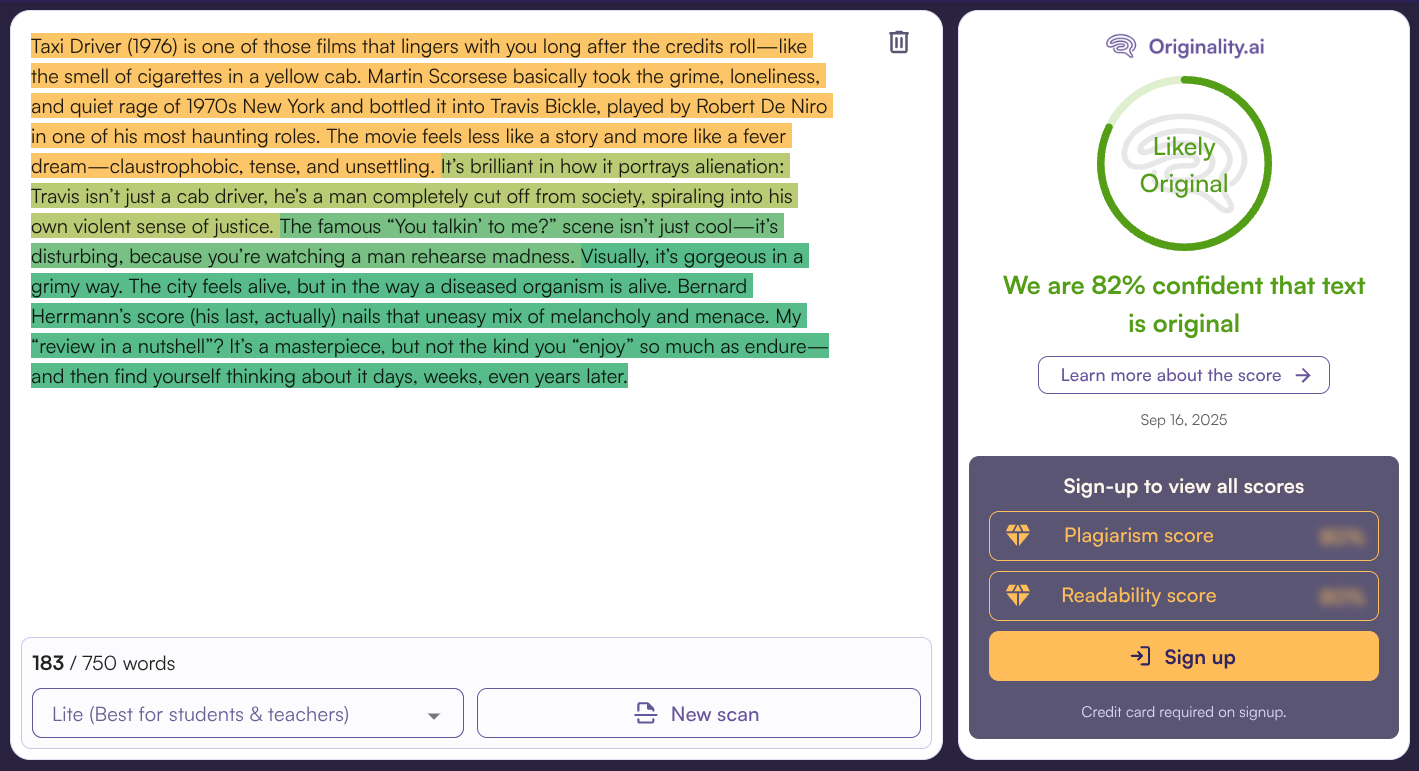
So, Originality has surprisingly failed the first and easiest part of the test.
Now let’s run our second text sample through it.
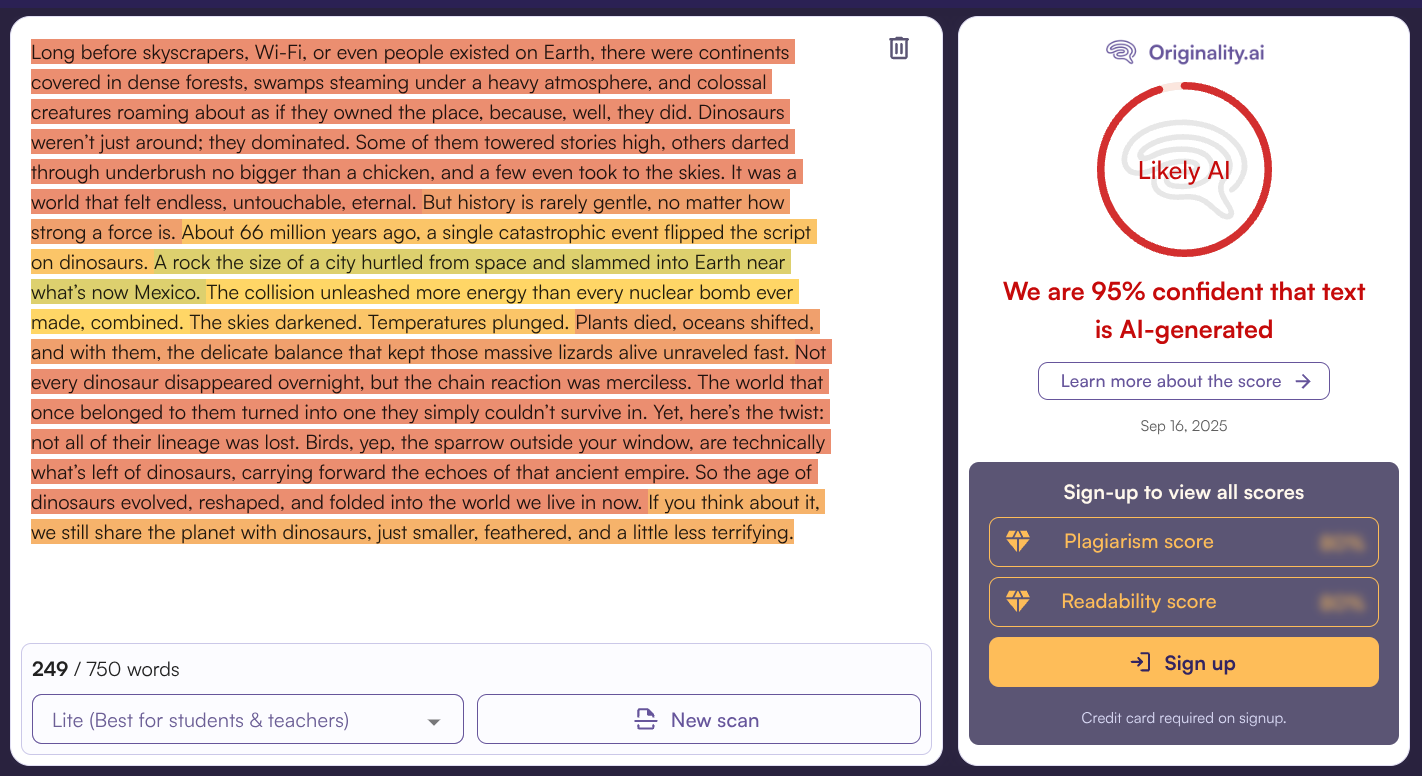
95% likely AI. When it should have been 100%.
Most of the text is highlighted in darker shades of red, meaning they have high AI-probability, which is fine.
But the lines in lighter shades are also AI, so it’s confusing why they didn’t get AI scores as high as other lines.
So, while Originilaity.ai, hasn’t failed here, it’s behind Winston.
Onto our last, fully human text sample now. Let’s hope Originality AI doesn’t disappoint us.
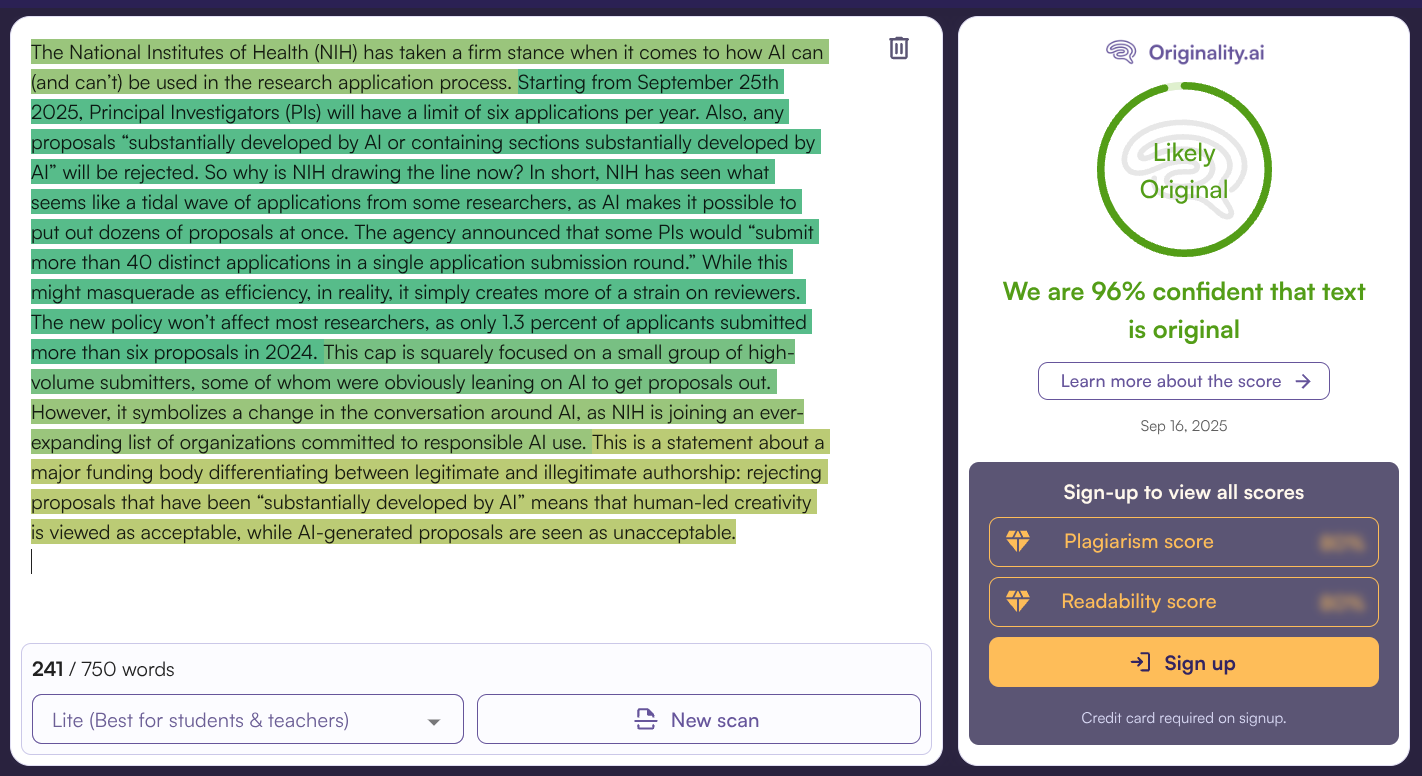
What? Even this isn’t 100% human? While 96% likely original score almost says that the text is fully human, it still leaves room for doubt about the originality of the text, which is unfair.
So, having pitted Winston AI vs Originality.ai, it’s evident that Winston has a more accurate AI detector.
Winston AI vs Originality.AI Plagiarism Checker
Having established Winston AI as a better AI detector, let’s now test who dominates the plagiarism test.
Let’s go with Originality.ai first.
As we said, we’ll be using text from a random Wikipedia page. How about we go with Superman (2025 film)? It doesn’t matter what source we choose, so let’s not dwell on that. We simply have to test whether Originality.ai’s plagiarism checker will be able to catch us plagiarizing content.
For the record, I’m pasting the screenshot of the first two paragraphs I’ll be using as the test sample.
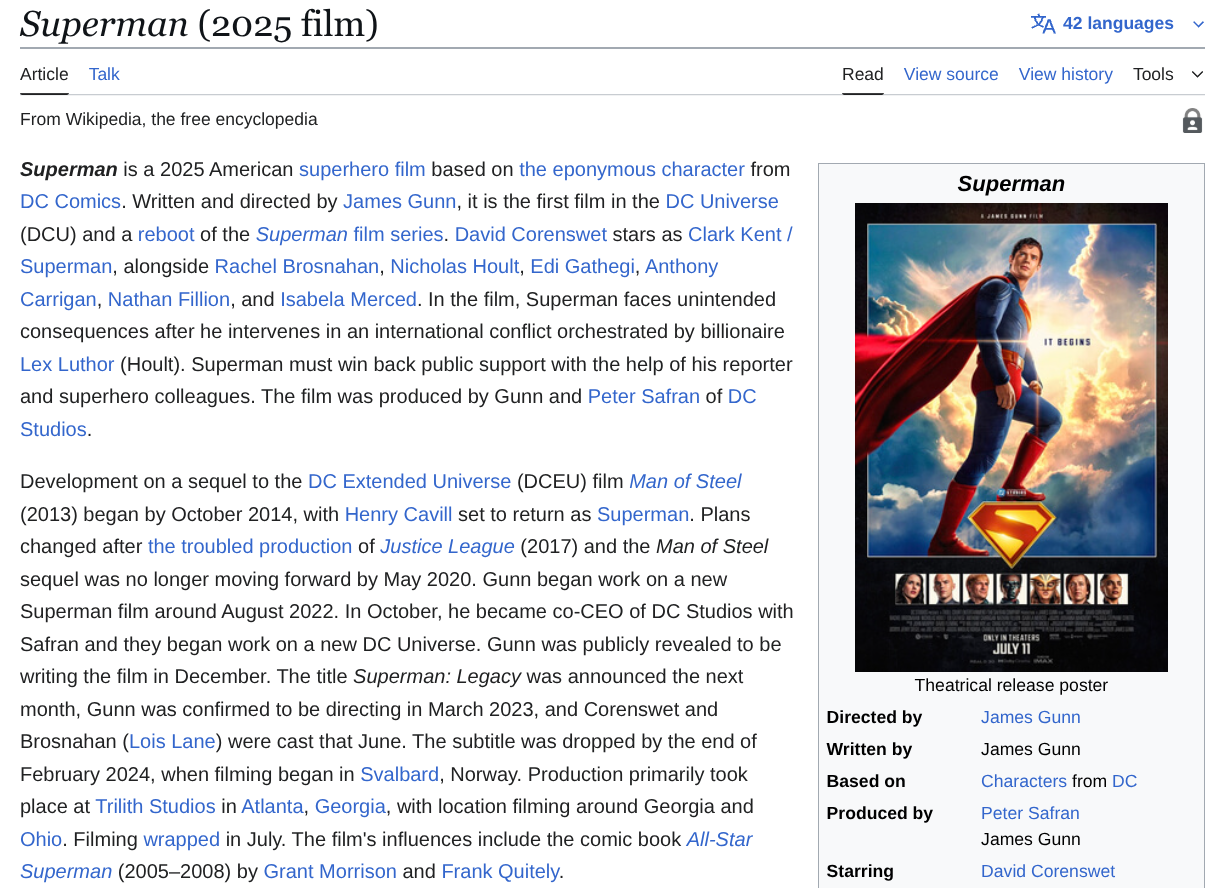
Pheww. Originality.ai managed to not disappoint us this time. It accurately detected that the text is 100% copied from the Wikipedia page. It traced the text to 169 other websites in total, but since we were on a free plan, it didn’t let us view beyond 1 source.
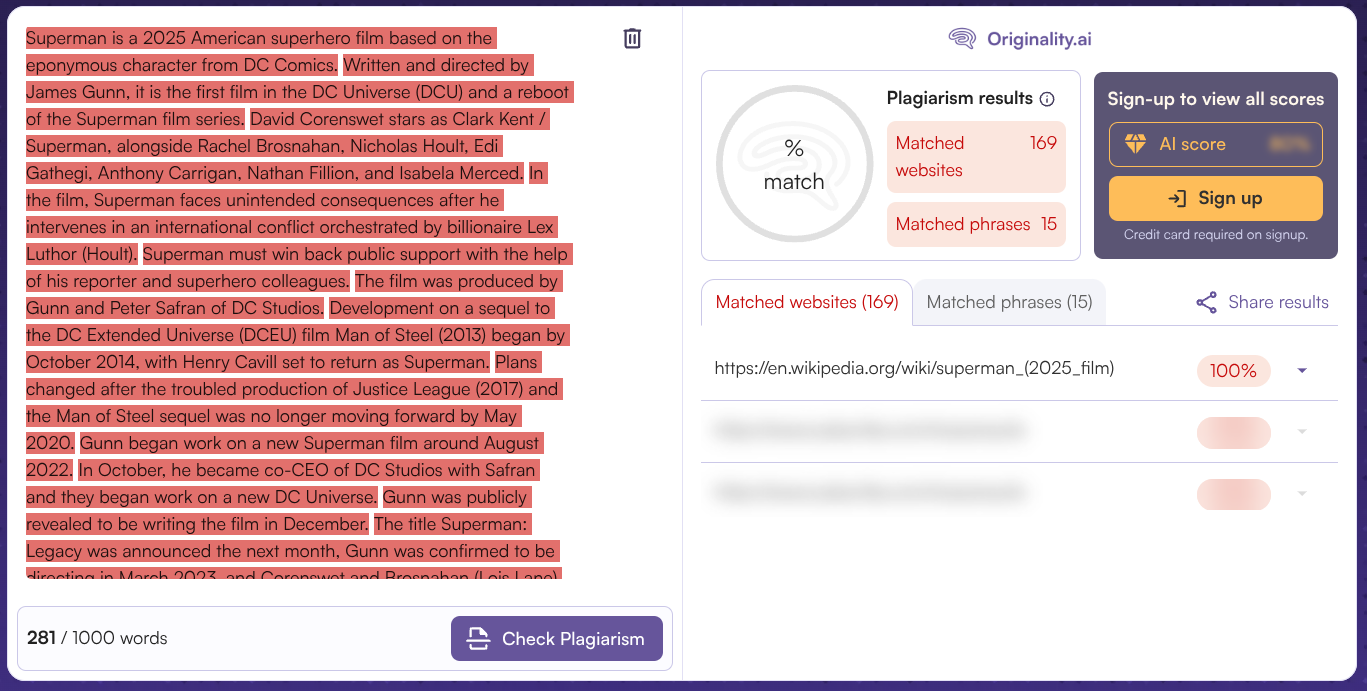
Let’s try to fool the tool. We’ll be using some of the text from this article and quietly hide a sentence from that Superman page between them.
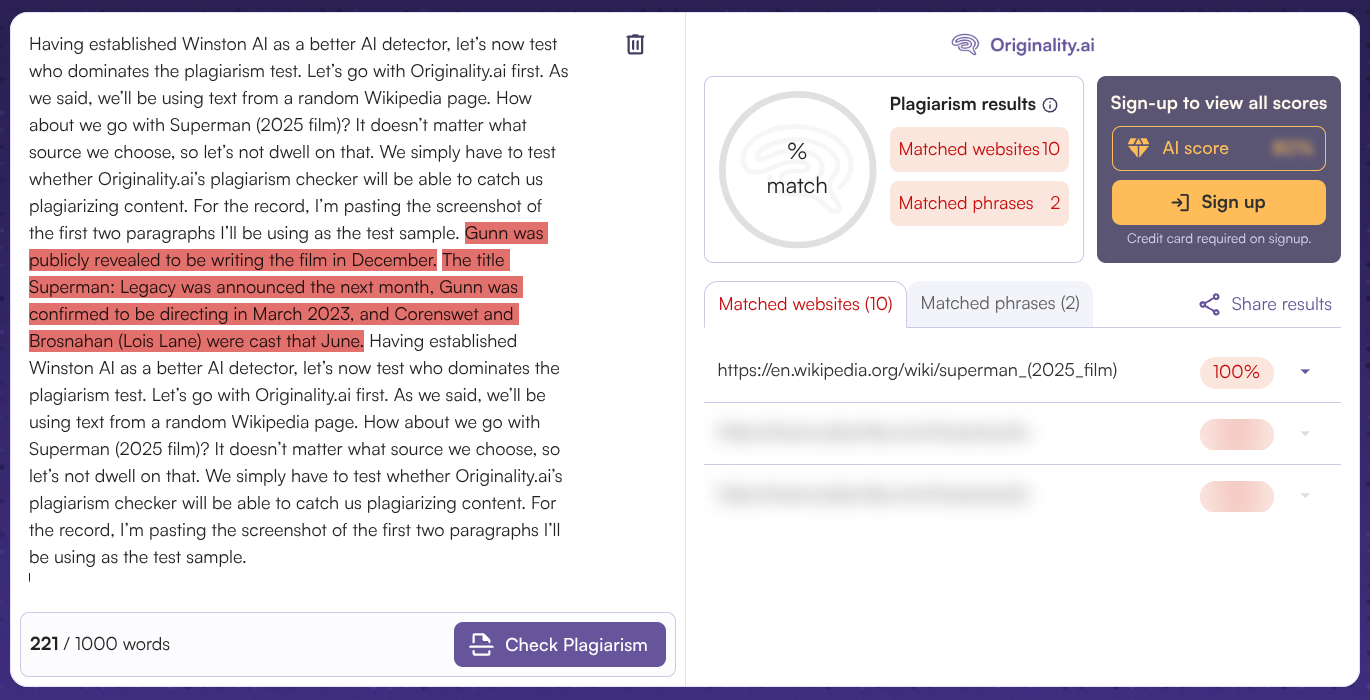
Still got caught.
So, credit where it’s due, Originality.ai’s Plagiarism detector is doing a pretty good job. Though for a full list of sources and plagiarism score, you’ll have to buy a plan.
That said, let’s try Winston.
Winston doesn’t have a free plan offering a plagiarism checking feature. Even their “Essential AI” paid plan doesn’t come with a Plagiarism checker. That’s an elite feature reserved for those who pay for their advanced and elite plans, which are $29 and $49 a month, respectively.
So here is our Winston AI plagiarism checking result.
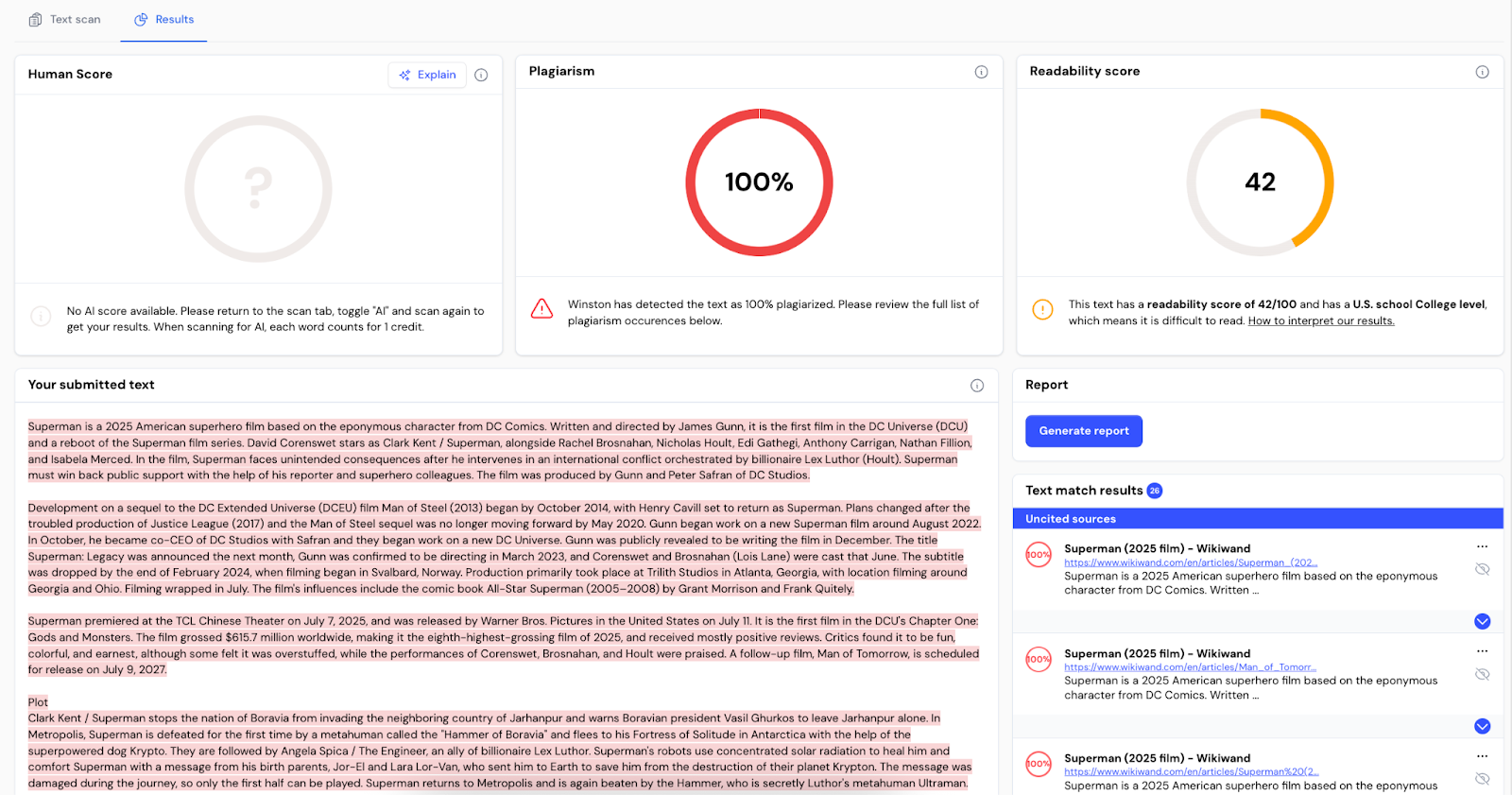
Winston accurately detected the content as 100% plagiarized from a Wikipedia article.
Now, let’s use some of our own non-plagiarized text from this article and quietly hide two sentences from the Superman Wikipedia article to test whether Winston can detect plagiarism accurately.
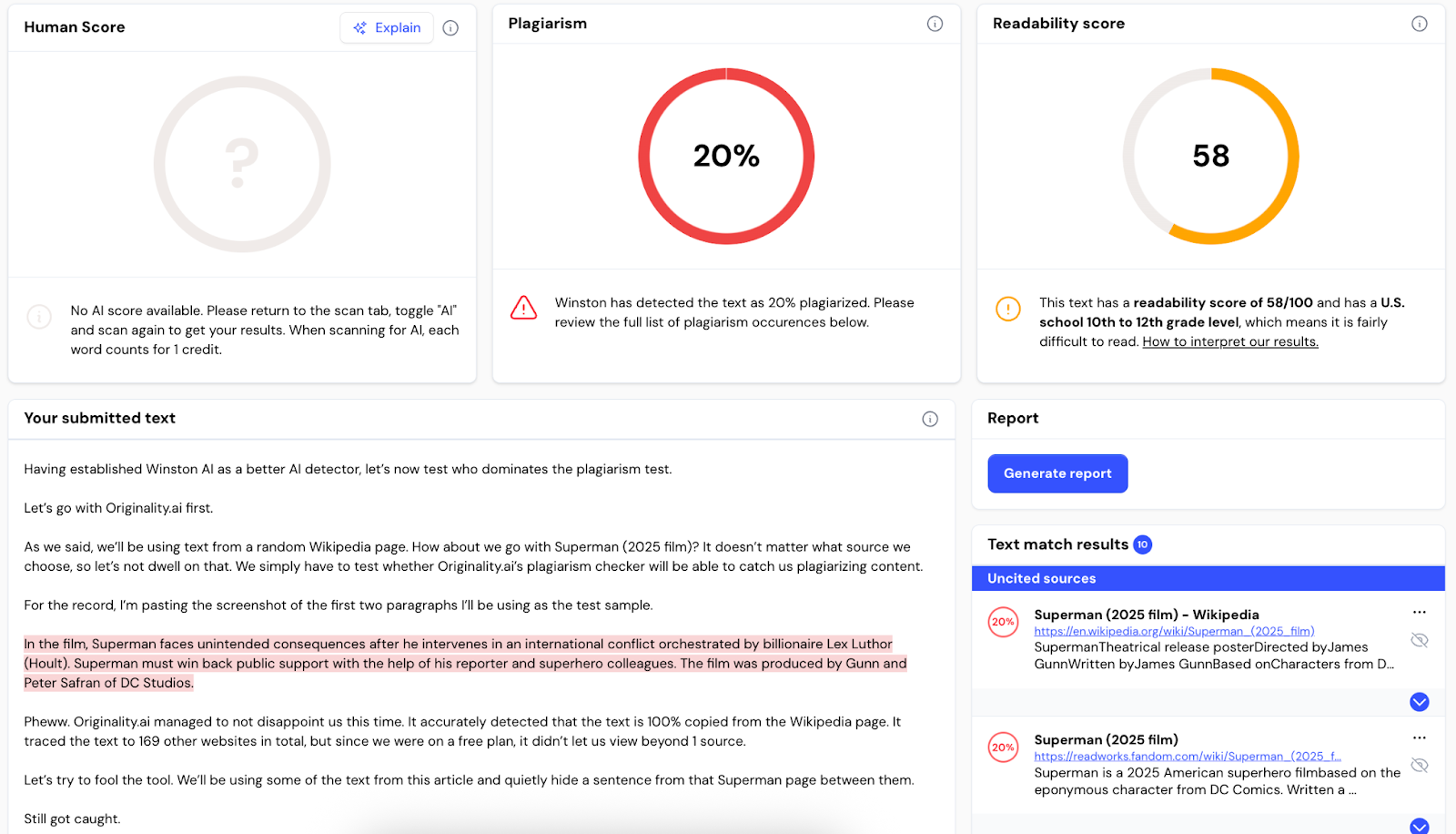
And still, Winston AI accurately detected the sentences from the Superman article as plagiarized.
So the takeaway is that both Originality AI and Winston AI perform well when it comes to plagiarism checking.
Winston AI vs Originality.ai Pricing
Since we’re being pushed by both tools to buy their plans to unlock advanced features, let’s see how much they cost.
Winston AI Pricing
Winston AI has four plans.
The free plan is actually a 14-day trial. It has a 2000 credits limit, which means you can test 2000 words for AI detection or 6 images for AI detection.
You don’t get the plagiarism detector in the free package.
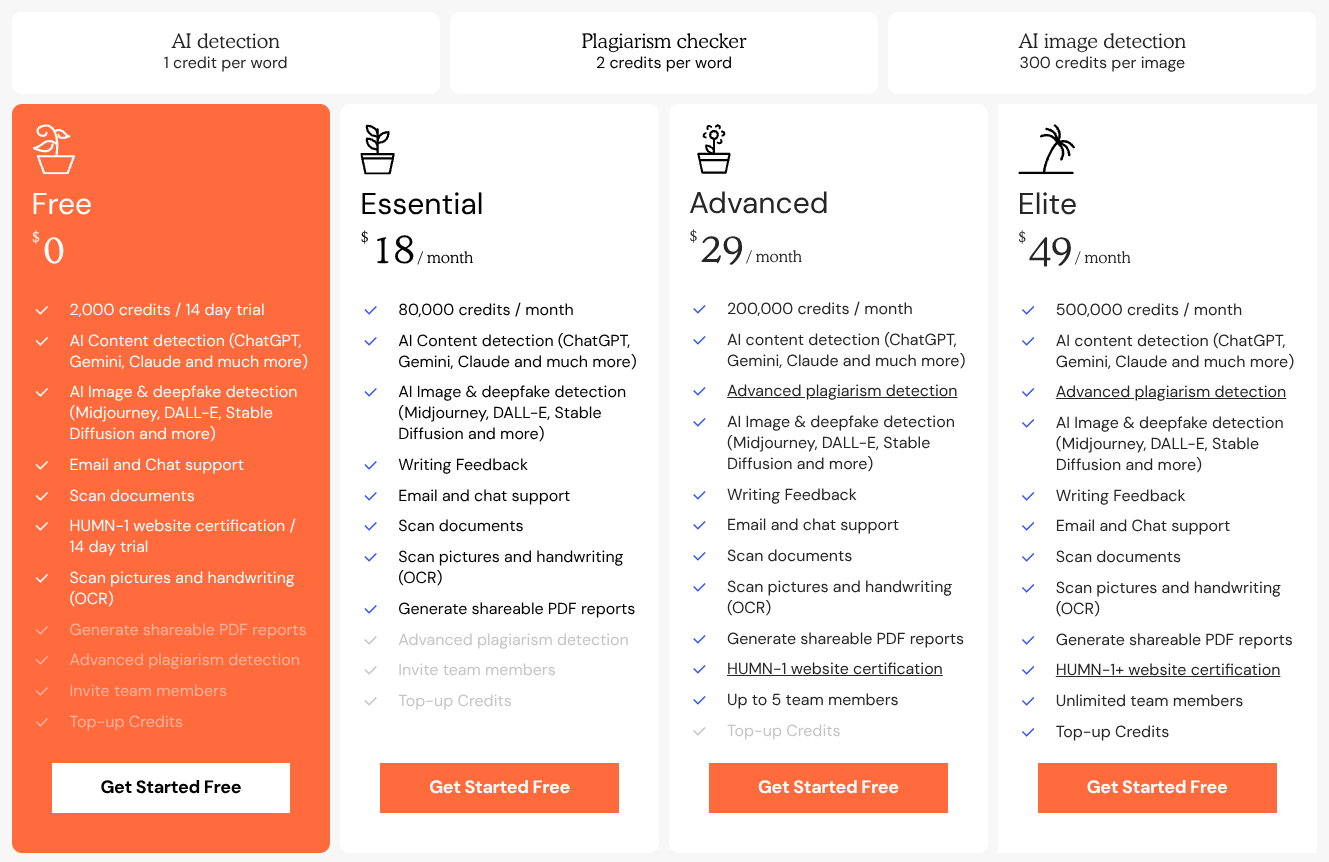
Even with the Essential plan, which costs $18/month, Winston doesn’t include plagiarism detection.
The other two plans, Advanced ($29/mo) and Elite ($49/mo), only differ in terms of credits count and the number of team members allowed.
Originality AI Pricing
Originality AI gives you a few free credits and lets you use all its tools (except bulk scan) for a few scans daily. Those free scans can only be a few hundred words. Once those scans expire, you’ll have to wait for the next day or sign up and buy a plan.
The credit system of Originality works differently from Winston's. 1 credit of Originality lets you scan 100 words using any of the tools.
That said, Originality AI has three pricing plans.
One good thing about Originality is that it also offers a Pay as you go plan with a 2 year expiry.
So if you want credits that you aren’t going to consume in a single month, this plan is good for you. And it costs $30.
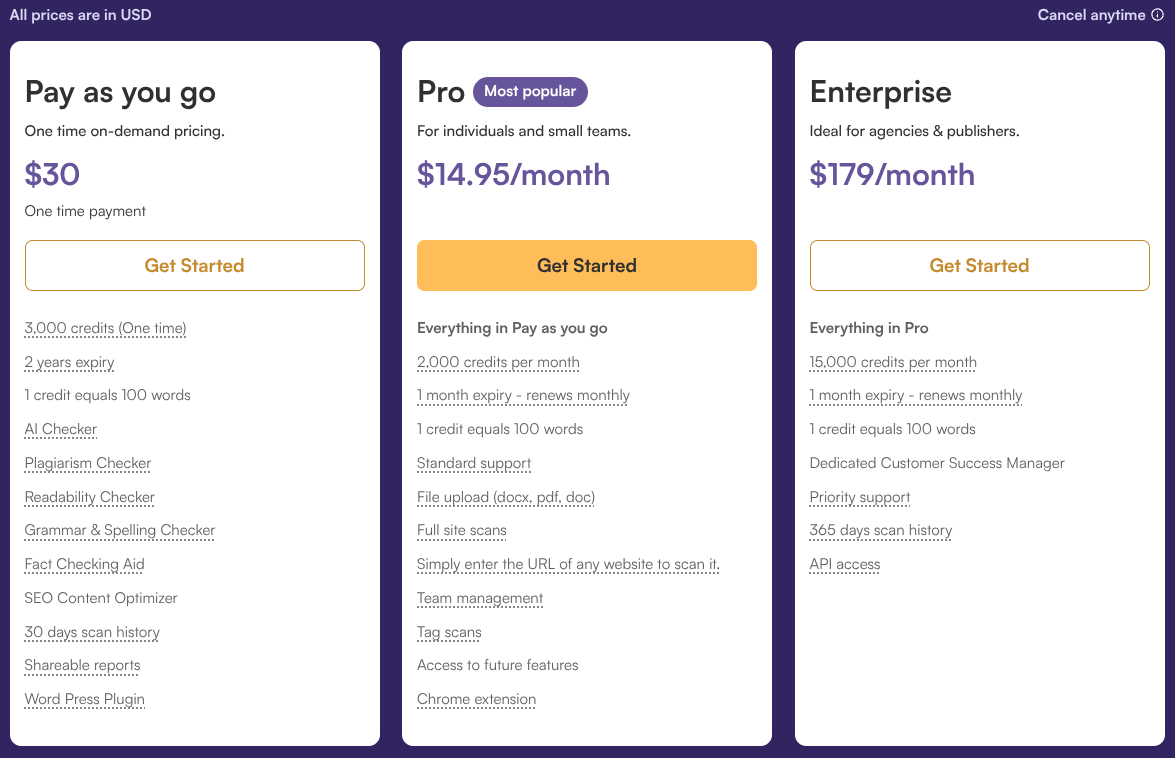
The Pro plan costs $14.95 a month, while the Enterprise plan costs $179/month.
Both of these plans are almost identical in what features they unlock. The only differences are credits per month, scan history (30 vs 365 days), customer support (standard vs priority), and API access (not available in Pro plan).
If we compare Winston AI vs Originality.ai pricing, Originality AI appears to offer more value for less money.
Take the first monthly plan of both, for instance:
- Winston AI Essential plan: $18/month (80k credits, 1 credit = 1 word)
- Originality AI Pro plan: $14.95/month (2k credits, 1 credit = 100 words)
Where Winston AI lets you scan 80k words for AI detection and Image generation for $18, Originality AI lets you scan 200k words, with all its tools at your disposal, that too at a cheaper price.
Winston AI vs Originality.ai User Reviews & Ratings
That was our review of both the tools. Let’s see what other users have experienced using both the tools.
Winston AI Ratings and Reviews
Winston has a 3.9-star rating on Trustpilot and 4.4 stars on G2, based on 16 and 13 user reviews, respectively.
Most users find its ease of use satisfactory as well as its AI detection accuracy.
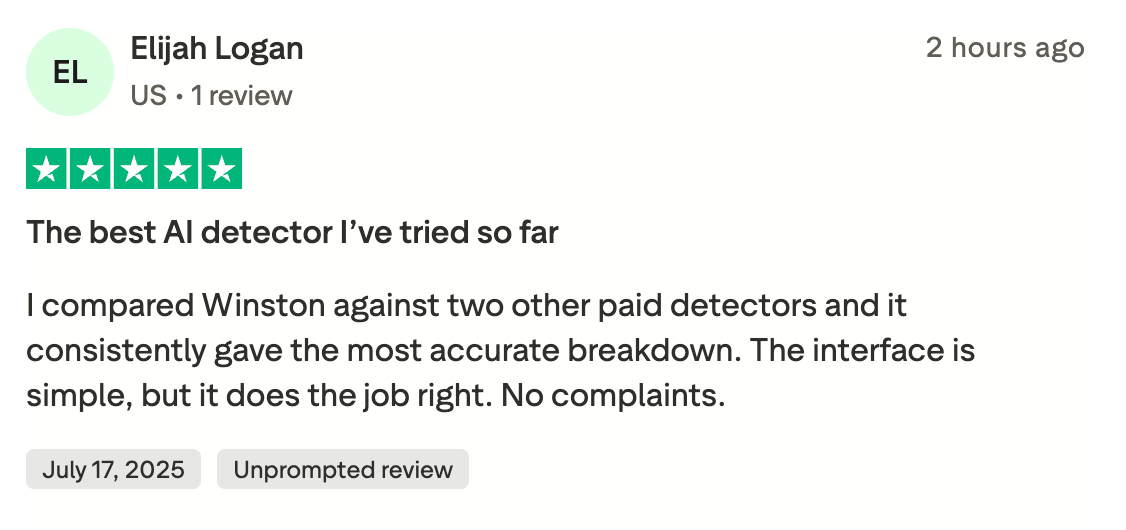
On the other hand, some users have also experienced inaccurate AI detection at times. But most users don’t like the low credit limit and the fact that Plagiarism detection isn’t available to test for free.
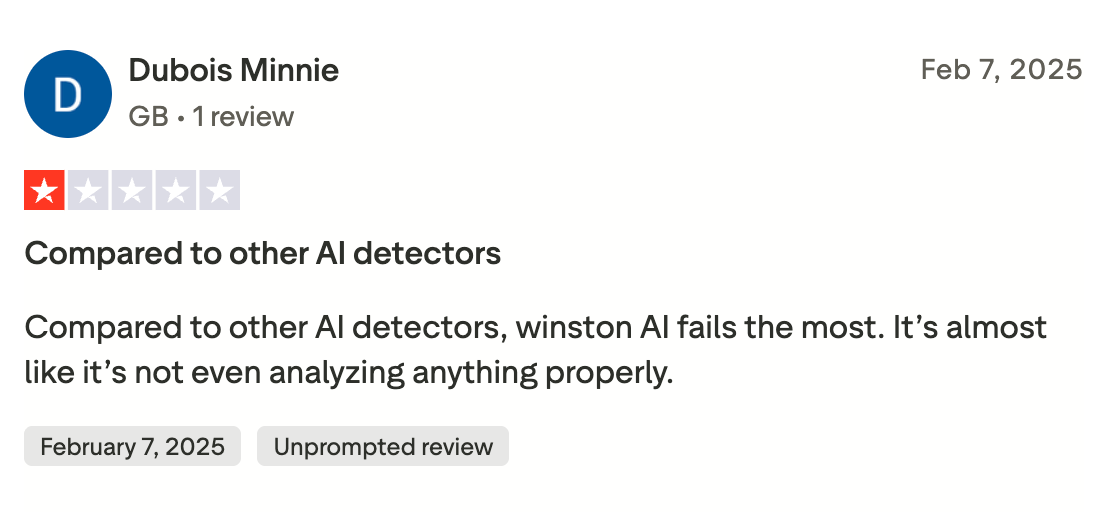
Originality AI Ratings and Reviews
Originality AI has a 4.4-star rating on G2 based on 33 reviews.
And on Trustpilot, it has a rating of 4.5 stars based on a whopping 720 reviews. Maintaining a 4.5 rating based on that many reviews is a big achievement.
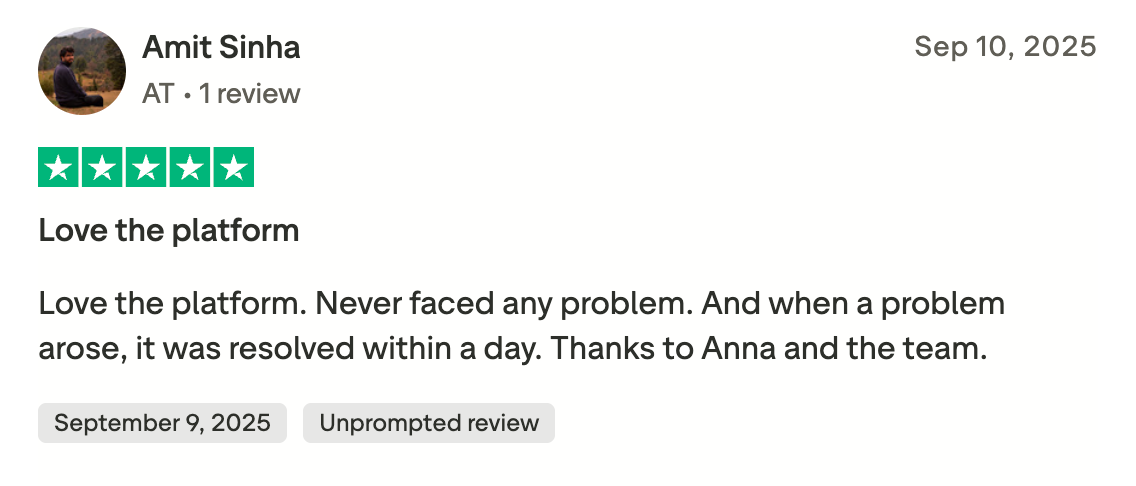
Users seem happy about almost all features (ease of use, tools range, customer support, Chrome extension, etc) but one thing. Guess what that thing is?
The occasional false positives, which we also came across in our testing. An increasing number of user reviews highlight the occasional inaccuracy of Originality as their sole issue.
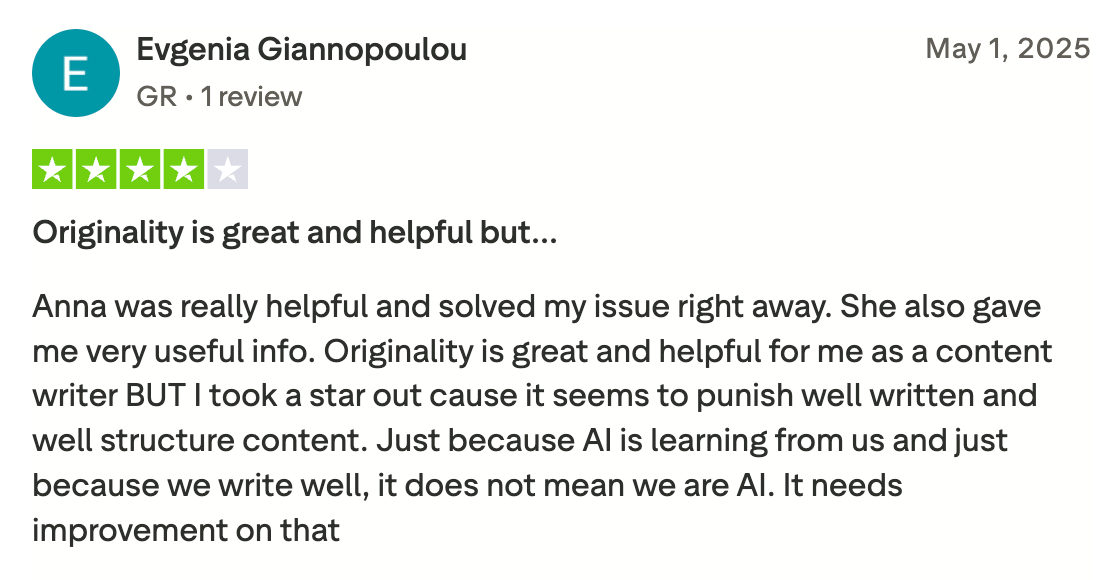
Other than this, the majority are happy with everything else.
Winston AI vs Originality.ai Pros & Cons
Final Verdict: What’s the Best AI Detector in Industry?
Having gone over everything, what’s the takeaway from our Winston AI vs Originality.ai comparison?
Which platform is the better of the two? The answer to this depends on your preference.
If you want strictly accurate scans, Winston is the better Originality AI alternative.
But that’s about it for Winston AI.
Originality AI is the better performer in more areas. It lets you use almost all its tools for free and with all its plans. Whereas, we saw Winston limiting its plagiarism checker for the paid plans (Advanced and Elite).
In addition, Originality AI charges less than Winston but allows you to scan more words/month.
However, if you want an AI image detector, you’ll have to go to Winston.
In conclusion, both these tools have their weak and strong points.
If you want an AI detector that’s way better than the two and more professional in how it detects your text, you should use GPTZero.
GPTZero has a tested 99% AI detection accuracy, and it was named as the #1 Best AI Software Product of 2025 by G2.
So, give it a try and see why it’s the top AI detector in the industry.
FAQs
Is Originality AI free?
Originality AI is free to use for a number of scans daily, having a few hundred words only. After you have consumed your daily scan limit, you’ll have to wait until the next day or buy a plan.
Is Winston AI better than Turnitin?
Both Winston AI and Turnitin have their best use cases. Winston has high AI detection accuracy, but is a lesser known plagiarism detector. On the other hand, Turnitin is the go-to plagiarism detector for professional and academic setups. It is also the better choice for integration into LMS.
